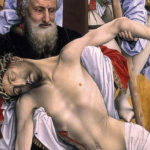
There are varied ways to interpret and manage our lives. The main ones are what we term in generality as natural and supernatural in some combination of concepts. Some persons accept one and not the other, to the denial or disparagement of the other. Even some religions do not include God, but advance high ethical context for life, even using substitutes for parallels with those persons holding faith in the divine – such as advocating meditation that incorporates amended characteristics of prayer and worship. Some simple faiths are built on a reverse philosophy so to attract worship of spirits that may be identified as evil. The logic for these persons hold that God is good so will not hurt us… Read more







